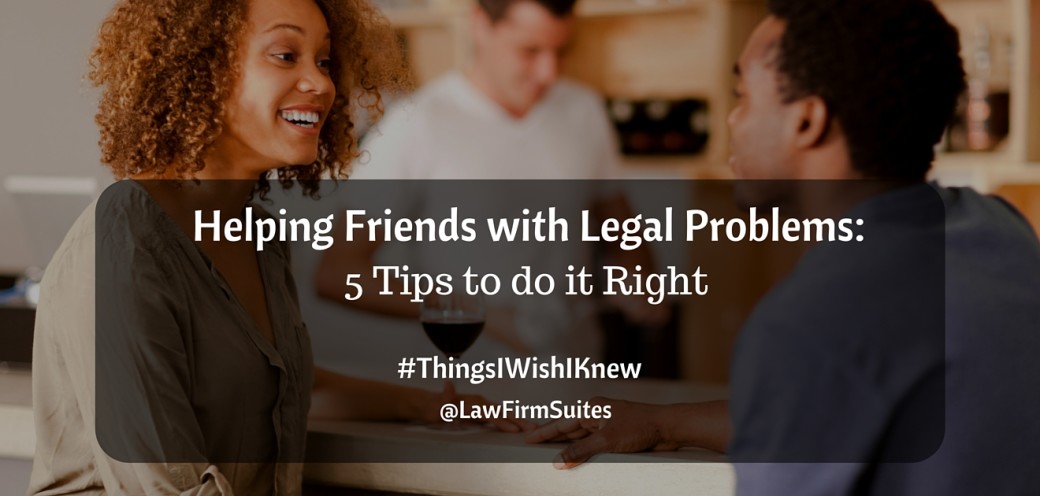In this week’s edition of Things I Wish I Knew, Joleena Louis discusses how to protect personal relationships when agreeing to represent friends or family members.
We love our friends and family and they are often our greatest supporters. Life happens and sometimes our own friends and family need legal assistance.
When a friend or family member is faced with legal troubles, it is only natural to want to help them. However, mixing business with friendship can often put a strain on our personal relationships.
When a friend or family member is faced with legal troubles, it is only natural to want to help them. Click To TweetEarly in my practice, a friend was ending her marriage and and she asked me to represent her in the divorce proceeding.
She couldn’t pay the entire retainer up front so we came up with a payment plan. We agreed she would pay the entire retainer in two months. I trusted her to keep up her end of the bargain and began working before being paid in full.
Six months later, she still hadn’t paid most of the retainer and I had done a lot of work. She was frustrated that I kept “hounding” her for money and I felt like she took advantage of my services.
I know many other solos who have dealt with similar situations. From my experience and theirs, I’ve picked up a few tips to help you represent a friend or family member without damaging your relationship.
1. Keep it professional.
From the beginning, you as a solo attorney need to lay down the ground rules and treat your friend as you would any other client. Doing this allows you to both know what to expect and frees you up to provide them with your normal standard of service.
Bending the rules because the person is a friend or family member might lead to crossed boundaries that you may resent later on.
2. Get it in writing.
This is something solos tend to neglect when representing a friend.
You do a little favor, and then it grows into something you didn’t intend to take on. Always have a written engagement agreement that outlines what is expected of you in writing.
When doing favors without being on the same page with a written agreement, what is expected of you can become very vague. You may think you are doing one small thing, they might think you agree to handle an entire matter. The confusion will often lead to strains in the the relationship.
3. Separate business time from social time.
If you’re talking to your friend at a party about her case, do you bill for it? What if all she ever talks to you about now is her case?
Set boundaries from the beginning to avoid these awkward situations. You will only discuss the case at scheduled times and not in social settings. Not only does this help you to protect your relationship, but it also helps keep information confidential.
4. Make sure you get paid.
Money is often the primary issue solos encounter when representing friends.
Money is often the primary issue solos encounter when representing friends. Click To TweetCollecting from a friend can be very awkward, especially if the friend is already in a crisis. In fact, it can stress some people out entirely!
Beyond the personal relationship, you have to remember your time is valuable. Having a friend or family member pay what you think your time is worth will prevent you from resenting them down the line when their small problem turns into a full-on litigation.
I also encourage getting paid up front. It’s the people I know and trusted who have burned me on payment plans. It’s one thing to hound a stranger for money, but it’s a lot more difficult if it’s a friend.
5. Consider the potential for personality conflict.
You want to help your friend, but often the person who is great to have a glass of wine with may be an impossible client.
When it comes a representing a typical client, you may be able to put up with their quirks or antics. But add in the emotional baggage that may come with representing a friend and that person may become intolerable. If you are going to represent them, they must have a personality you can work with.
Before agreeing to represent a friend, give it some serious thought. Are you doing the best thing for your friend by representing them, or would their interests (and your respective relationship) be better served if you simply referred the case to a colleague?
Chances are the other attorney will greatly appreciate the referral, and will return the favor the next time she is in a similar position, and the client will appreciate you guiding them into the trusted hands of another counselor.
In the case of my friend, I did get paid in full, but our personal relationship ended up being ruined.
Hopefully with these tips, you can represent a friend (or gracefully refer it out to a colleague) and not ruin your relationship.


